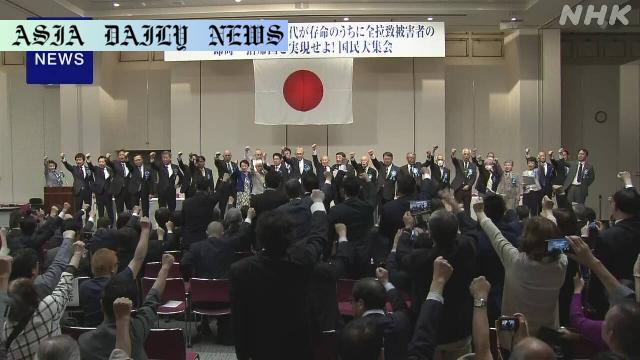Abductees—Families urge the Japanese government for swift action on the decades-long North Korea abductions issue.

Family Demands for Swift Resolution
The families of Japanese nationals abducted by North Korea decades ago convened a gathering in Tokyo to urge the Japanese government to address the issue with increased urgency. The rally, which saw the participation of around 800 individuals, highlighted the growing frustration among families over the lack of resolutions. Among the attendees was Prime Minister Ishiba Shigeru, whose presence underscored the political attention this issue continues to receive. The loss of Arimoto Akihiro, who died in February 2023 without being reunited with his abducted daughter Keiko, further intensified calls for decisive action.
The emotional depth of the event was palpable as Yokota Takuya, who leads the families’ group, expressed his anguish over Akihiro’s tragic passing without closure. Takuya personally appealed to Prime Minister Ishiba to facilitate a long-overdue bilateral summit with North Korean leader Kim Jong Un. This, he stressed, remains the sole pathway to ensuring the safe return of abducted citizens.
Reiterated Calls for a Bilateral Summit
Prime Minister Ishiba addressed the rally, acknowledging the emotional and moral weight of the families’ plea. He emphasized that the abductions represent not only a breach of human rights but also a direct infringement on Japan’s sovereignty. By committing to renewed diplomatic efforts, Ishiba assured participants of his resolve to address the issue at the highest levels of international engagement. He affirmed that negotiating directly with North Korean leadership would provide the best chance at a resolution.
The rally culminated with the adoption of a collective resolution urging the Japanese government to bring all abductees home immediately. The resolution also called upon North Korea to repatriate its victims swiftly and demonstrate goodwill in resolving a longstanding grievance.
Voices of the Families: A Testament to Resilience
Among the most poignant voices at the Tokyo event was that of Yokota Sakie, the mother of Megumi Yokota, who was abducted in 1977. At 89, Sakie remains the only surviving parent of the officially recognized abductees who are still believed to be in North Korea. Sakie described her commitment to staying healthy and optimistic, hoping to live long enough to welcome her daughter back to Japan. Such resilience epitomizes the enduring spirit of families who have tirelessly advocated for justice over the years.
The drive to unite abductees with their families remains a deeply personal and national mission. For families like the Yokotas, advocacy is fueled by the immense pain of separation and an unwavering desire to reunite with loved ones. Their collective voice serves as both a reminder of the human toll of political disputes and a rallying cry for government action.
Future Path: Challenges and Hope
The issue of Japanese nationals abducted by North Korea has persisted for nearly five decades, underlining the significant diplomatic and political challenges involved. While acknowledgment of the problem is a positive step, meaningful outcomes will require robust, strategic engagement between the concerned nations. Families believe a direct summit between Prime Minister Ishiba and Kim Jong Un is the most viable solution to achieve breakthroughs.
The clock continues to tick for older relatives of those abducted, making time an inescapable factor in this fight for resolution. The families’ steadfast resilience and the public’s growing awareness of the issue underscore the urgent need for effective government action. This historical injustice demands resolution—not just for the individuals involved, but for the broader principles of human rights and sovereignty.
Commentary
The Unyielding Struggle of Abductees’ Families
The issue of Japanese nationals abducted by North Korea remains one of profound human tragedy and enduring hope. Hearing the voices of family members, like the Yokotas, highlights not just individual anguish but also collective resilience. These families have carried the burden of unresolved grief for decades while navigating the complexities of international diplomacy.
Prime Minister’s Role in Shaping Outcomes
Prime Minister Ishiba’s presence at the rally was a critical moment, reflecting a recognition of the urgency surrounding the issue. While his commitment to seeking a bilateral summit with Kim Jong Un is a welcome gesture, history has shown that translating such promises into concrete actions is an arduous task. Nevertheless, this acknowledgment must serve as a launchpad for sustained efforts—not just fleeting diplomatic overtures.
The Human Face of Political Disputes
The stories shared at the rally serve as a powerful reminder of the human consequences of geopolitical conflicts. Behind every statistic is a family yearning for reunion, a parent clinging to the hope of saying ‘welcome back’ to their child. The resilience displayed by matriarchs like Yokota Sakie is emblematic of a spirit that refuses to succumb to despair.
As public attention sharpens around this issue, one can only hope that governments on both sides find common ground to prioritize humanity over politics. The return of abducted citizens would not just be a victory for affected families but a broader testament to the power of resilience, justice, and international cooperation.


